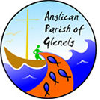Good Shepherd Sunday – Easter 4 Year C 2019
Key texts – John 10:22-30 & Acts 9:36-43
Preached by Ven Andrew Mintern,
Parish Priest and Archdeacon of Torrens
Do you think of yourself as a sheep? Probably not I would think. It’s generally a bit of an insult to call someone a sheep, it has implications of not thinking for yourself and simply going with the group , usually implying doing so rather stupidly.
When Jo and I find ourselves in one of those queues with lots of people, say at the airport, where even though where you want to get to is just a few metres over there, you find you have to shuffle zig-zagging back and forth, back and forth, for quite a distance to get where you want to go. It’s not unusual at these times for Jo to start going “Baaa Baaa”.
So if this is the connotation, why on earth would we want to be a sheep? And yet, one of the most popular and beautiful passages of the Old Testament is “The Lord is my shepherd, I shall not want, he makes me lie down in green pastures, and leads me beside still waters.” We find it instantly reassuring to hear those words from Psalm 23.
When Jesus says: “I am the good shepherd. I know my sheep and my sheep know me” there is no sense of denigration towards the sheep. Rather he expresses a relationship of love and care.
There are times when we can’t get away from the agrarian context of the biblical writings. The imagery is often about sheep, goats, cattle, wheat, milk, honey and so on. Things that we urbanites don’t have everyday hands-on contact with, except through the shelves of the supermarket.
Some Christian groups or sects think you have to go back to that sort of simple lifestyle in order to be faithful, think of the Amish, or those Christian groups who insist on dressing in old fashioned ways. But that is to fail to see that what Jesus did was to look around at the contemporary everyday things in people’s lives, they way they lived, and used those things to talk illustratively about God. To really make the point that God is known and experienced and understood through our everyday context.
If Jesus was physically before us today he would not be saying: I am the good shepherd, to an urban audience. He would instead be communicating the reality of God in a relevant contemporary way. I really struggle to imagine what he would use though – I am the good footy coach, doesn’t quite seem to cut it. I am the good life-saver might be a bit better. I am the good politician? Okay… I’ll let you mull over that and see what you think he might say. Whilst you’re doing that, let’s not give up totally on the shepherd image and examine it a bit more closely.
In Psalm 23 – God the shepherd provides for a complex set of human needs – our need for safety, our need for guidance, for protection, sustenance, care, respect, mercy and hope. It is amazing that in such a few short verses so much of our faith and so much of our deepest yearnings is captured in this beautiful psalm. Jesus draws on this beautiful and powerful image in speaking of himself as the good shepherd, the “good” differentiating him from the hired hand who might run away when trouble comes. Jesus is committed to the sheep, he is the gate to the sheepfold, he embraces them, he gives them life and he protects them and they are safe for no one can snatch them from his hand.
I really struggle to think of any contemporary image that captures the range of needs that the shepherd image responds to. And so I think that explains why we still hold it so dear. Yes perhaps there is a sentimental idyllic country element to it, but it is more than that for it wouldn’t be so meaningful if that was all it was. Jesus embodies God’s commitment to us, draws us to himself, leads us, guides us, sustains us, feeds us, protects us, loves us and gives us life.
Our response to this awesome commitment and love is praise and discipleship. Like Tabitha in the New Testament reading, who incidentally is the only woman in the whole New Testament identified as mathetria, the feminine form of the word disciple, we are called to respond with faithfulness and loving service, and the gifts we offer in love and service are treasured by God, like the community around Tabitha treasured all that she had made.
So I’ll conclude this sermon with a song (Together in Song 659) which beautifully captures the leading of the shepherd but also our commitment to discipleship.
The Lord is my shepherd and I want to follow
Wherever he leads me, wherever he goes.
Over the mountains, the waters and byways,
valleys and highways he’s waiting for me.
I want to go to meet him there, to lay myself down in his love.
the Lord is my shepherd and I want to follow wherever he leads me, wherever he goes.
And while on the journey to where we are going
He promised to be there to help us along,
and over the mountains we’ll walk on together,
to know all the wonders he’s given to me.
I want to go to meet him there, to lay myself down in his love.
the Lord is my shepherd and I want to follow wherever he leads me, wherever he goes.
Lyrics Brian Boniwell based on Psalm 23
